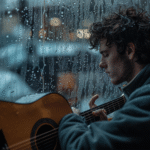Now Reading: Age Restrictions, Moral Panic, and the Future of Artistic Censorship –
-
01
Age Restrictions, Moral Panic, and the Future of Artistic Censorship –
Age Restrictions, Moral Panic, and the Future of Artistic Censorship –

In the fallout of the newly introduced age restriction laws, a familiar unease has crept into the UK music scene. Creatives are being force-fed headlines soaked in scaremongering, while lawmakers throw around terms like “age assurance” and “protection of minors” with all the grace of a brick through a studio window. If you believe the louder voices, censorship is already on the march, preparing to muzzle any artist bold enough to say something uncomfortable. But before we start eulogising creative freedom, it’s worth interrogating the actual impact. Because what’s really at stake isn’t legality—it’s visibility, viability, and the ever-narrowing space for unfiltered artistic honesty.
The Thin Line Between Safeguarding and Silencing
The UK’s Online Safety Act and its EU counterpart, the Digital Services Act, were introduced under the pretence of making digital spaces safer for children and teenagers. In theory, the legislation doesn’t go after musicians—it targets platforms, asking them to implement age gating for content that’s “potentially harmful”. But history has shown us what happens when vague definitions and moral outrage collide. Music becomes the scapegoat again. One minute you’re expressing your reality, the next you’re flagged for “inappropriate content” because someone’s algorithm misread your metaphor about addiction or mental health.
This isn’t new territory. We’ve seen it all before: from obscenity trials to parental advisory stickers, punk bans to grime criminalisation. The motive behind the restrictions is often cloaked in good intentions, but the result is eerily familiar—marginalised voices being pushed back into the shadows, punished for doing what the middle-class gatekeepers lack the guts or lived experience to do themselves.
False Panic, Real Consequences
While major outlets have been quick to stoke the fire with talk of “artistic censorship”, the truth is a little more insidious. The laws may not explicitly censor music, but the climate they’re creating absolutely will. Tech platforms—motivated more by compliance than conscience—will likely begin over-policing uploads and tweaking their algorithms to suppress anything remotely contentious. No fines, no fanfare, just fewer plays, lower reach, and a deafening silence where there used to be protest songs, underground rants, and therapy disguised as track three on a DIY EP.
Genres that wear grit like a badge of honour—drill, grime, punk, trap, hardcore—are already subjected to relentless scrutiny. These laws don’t make things better. They just hand decision-making power to corporations whose idea of safety often means sterilising anything that isn’t marketable to a family audience. That doesn’t just hurt art—it narrows culture into a commercial echo chamber where only sanitised, sponsor-friendly sounds survive.
Independent Artists Bear the Brunt
If a stadium-filling popstar gets shadowbanned, they have a PR team, label reps, and managers who can fight back. If a kid in Lewisham uploads a demo that references drugs or trauma and it gets buried, they’re just told to “try again later”. For independent artists, especially those from marginalised communities, the introduction of these laws isn’t just a bureaucratic nuisance—it’s a threat to their livelihood. Their reach is already hanging by a thread thanks to saturated platforms, disappearing organic engagement, and algorithmic roulette.
Strip visibility away from them, and you’re not just silencing an individual, you’re slowly eroding a subculture. Scenes don’t die with one big explosion. They fizzle out through a series of quiet exclusions: one fewer playlist slot, one less share, one suppressed hashtag at a time. You won’t even know it’s happening unless you’re inside it.
There’s also the mental toll. Making music is an emotional bloodletting at the best of times. Add financial precarity, digital invisibility, and the ever-present pressure to self-censor just in case a platform misjudges your intent, and you’re left with creatives too drained to create. That’s not protection. That’s passive erasure.
What’s Actually Next, and How Do We Push Back?
Despite the noise, this isn’t the end of the road. The laws are new, and the grey areas are plentiful. Implementation will vary from platform to platform, and the more resistance there is from the creative community, the less likely overcorrection becomes the norm. This is the time for pressure, not panic.
Artists should keep releasing music with teeth, labels need to protect the right to expression, and fans need to make it impossible for platforms to ignore the voices that matter. Because here’s the thing: censorship isn’t just about what gets banned. It’s about what gets ignored, sidelined, or quietly made unsearchable. And that battle is won with visibility, solidarity, and a refusal to dial things down for the comfort of the digital babysitters.
There’s also power in moving away from overregulated spaces. Bandcamp, SoundCloud, independent websites, physical releases, live events—all these spaces still exist. If major platforms become unfit for purpose, the music community will find another route. It always has. It always will.
Conclusion: The Sound of Resistance
The worst thing we could do now is fold. Artists aren’t the ones responsible for coddling the internet. They’re responsible for challenging it, critiquing it, and offering an alternative to the PR-filtered sludge we’re drip-fed daily. If your music speaks about addiction, trauma, sexuality, political unrest, or anything that challenges the status quo, you’re doing something right. Don’t apologise for it. Amplify it.
This era of quiet censorship disguised as safety will pass. But only if we make it clear that age-restricting content doesn’t mean stripping it of truth. Music has always been a pressure valve for pain, joy, protest, and survival. If a few algorithms can threaten that, it means we’ve put too much power in the wrong hands.
There is no final word on this. Only more sound. And that’s exactly what we need right now.
Article by Amelia Vandergast























